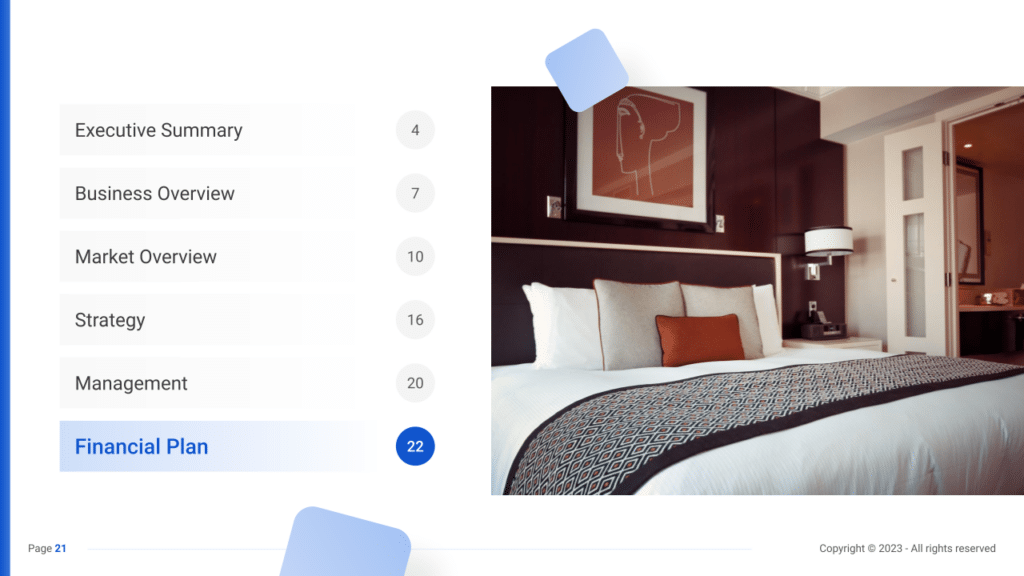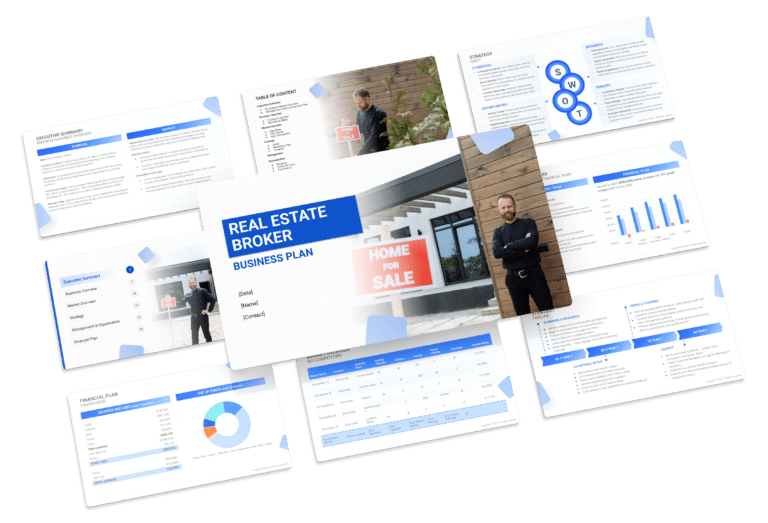Boutique Hotel Business Plan Template & PDF Example
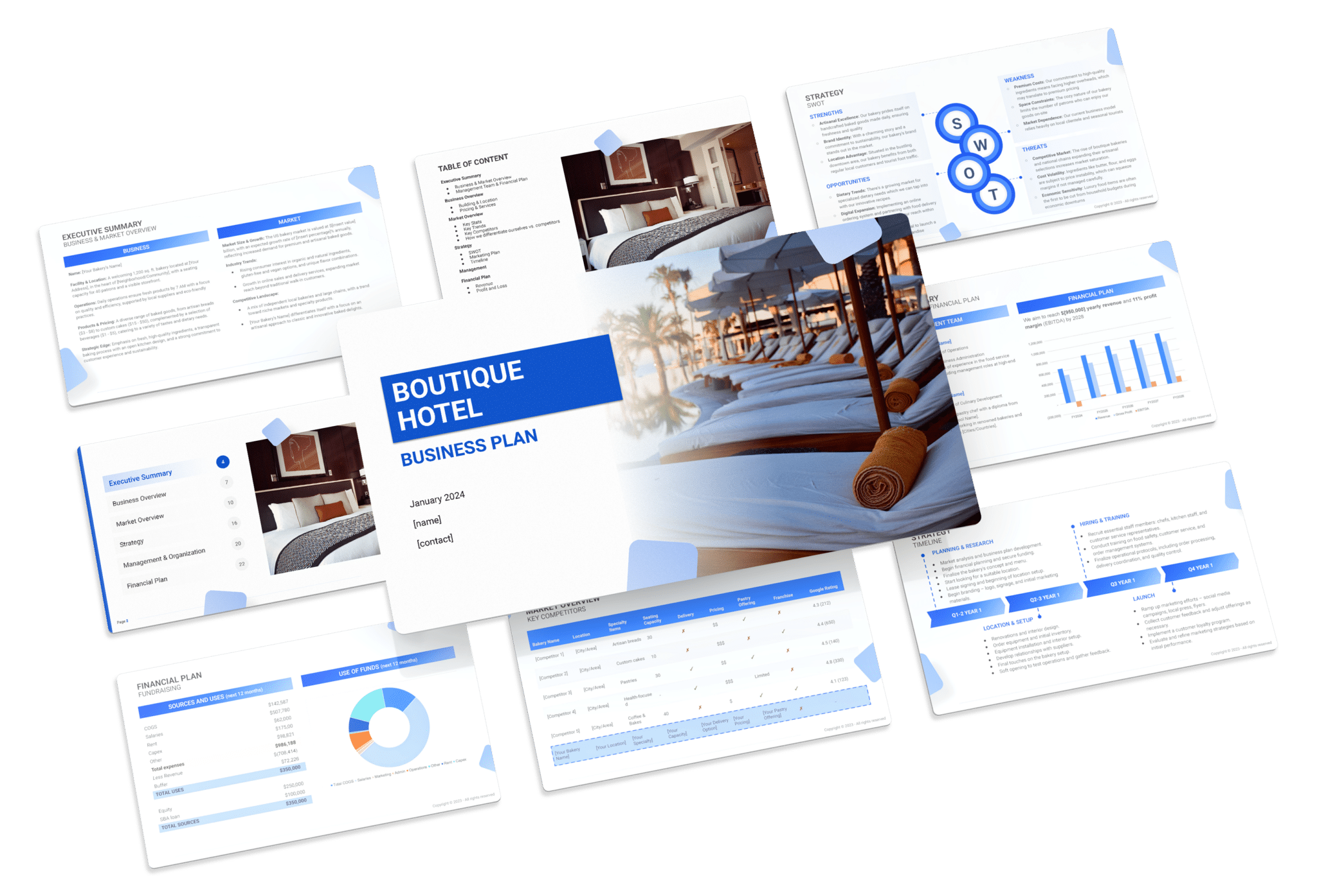
Creating a comprehensive business plan is crucial for launching and running a successful boutique hotel. This plan serves as your roadmap, detailing your vision, operational strategies, and financial plan. It helps establish your boutique hotel’s identity, navigate the competitive market, and secure funding for growth.
This article not only breaks down the critical components of a boutique hotel business plan, but also provides an example of a business plan to help you craft your own.
Whether you’re an experienced entrepreneur or new to the real estate industry, this guide, complete with a business plan example, lays the groundwork for turning your boutique hotel concept into reality. Let’s dive in!
The Plan
Our boutique hotel business plan is structured to cover all essential aspects needed for a comprehensive strategy. It outlines the hotel’s operations, marketing strategy, market environment, competitors, management team, and financial forecasts.
- Executive Summary: Provides a snapshot of your Boutique Hotel’s business concept, including market positioning, analysis, management team overview, and a summary of the financial strategy.
- Business Overview: Offers insights into the Boutique Hotel’s operational model and the unique experiences it provides to guests.
- Hotel & Location: Details the design, ambiance, and location benefits of the Boutique Hotel, highlighting its appeal to the targeted guest demographic.
- Rooms & Pricing: Lists the various types of accommodations and pricing strategies, emphasizing the value and experience offered to guests.
- Market Overview: Analyzes the current landscape of the boutique hotel industry, focusing on how your Boutique Hotel is positioned within the market.
- Key Stats: Presents important statistics about the boutique hotel market’s size, growth trends, and customer demand.
- Key Trends: Discusses recent and emerging trends in the boutique hotel sector and how they influence consumer preferences and hotel operations.
- Key Competitors: Evaluates primary competitors, showcasing how your Boutique Hotel differentiates itself in terms of concept, services, and guest experiences.
- Strategy: Describes the strategic approach the Boutique Hotel will take to achieve its business objectives and market positioning.
- SWOT: Conducts a comprehensive analysis of the Strengths, Weaknesses, Opportunities, and Threats related to the Boutique Hotel.
- Marketing Plan: Outlines the marketing strategies and tactics planned to attract and retain guests, build brand loyalty, and increase market visibility.
- Timeline: Details significant milestones and goals for the Boutique Hotel from pre-launch through the first year of operations, including marketing initiatives and any special events.
- Management: Provides information about the management team overseeing the Boutique Hotel, detailing their roles, expertise, and how they contribute to the hotel’s success.
- Financial Plan: Projects the Boutique Hotel’s financial performance over the next five years, including revenue sources, profit margins, and anticipated expenses, offering a clear picture of financial expectations and investment potential.

Executive Summary
The Executive Summary introduces your boutique hotel’s business plan, offering a succinct overview of your hotel and its offerings. It should detail your market positioning, the variety of accommodations and guest services you provide, its location, size, and an overview of daily operations.
This section should also delve into how your boutique hotel will integrate into the local hospitality market, including the number of direct competitors within the area, identifying who they are, along with your hotel’s unique selling points that differentiate it from these competitors.
Furthermore, you should include information about the management and co-founding team, detailing their roles and contributions to the hotel’s success. Additionally, a summary of your financial projections, including revenue and profits over the next five years, should be presented here to provide a clear picture of your hotel’s financial plan.
Boutique Hotel Business Plan Executive Summary Example
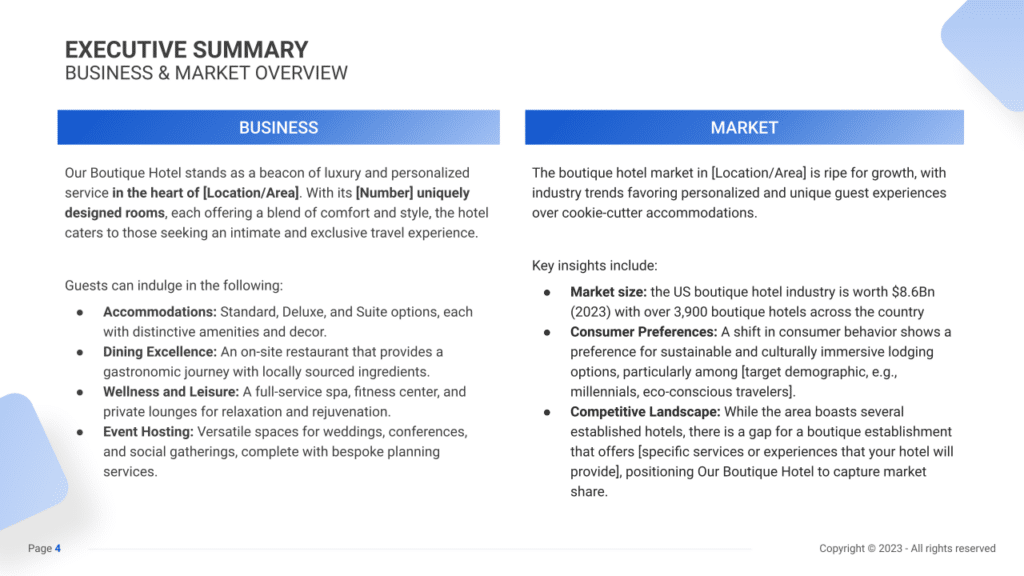
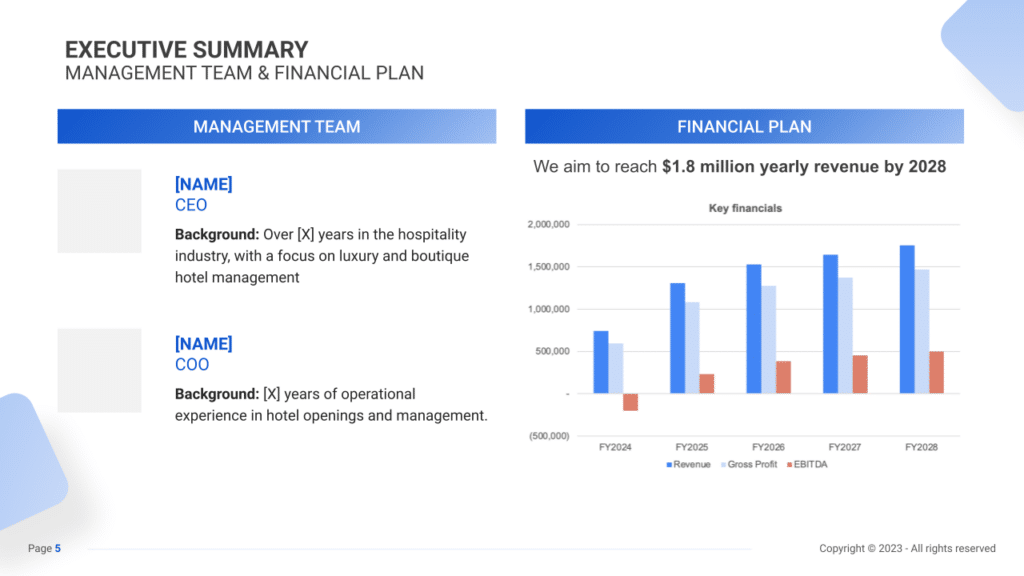
Business Overview
The business overview in your executive summary sets the stage for introducing your boutique hotel. It should succinctly present the hotel’s name, location, and core functionalities that define its distinctive features.
The heart of your boutique hotel’s success lies in its Unique Selling Proposition (USP). Whether it’s the personalized guest experience, the bespoke design of each room, or the fusion of luxury and sustainability, your USP must shine through this section, capturing the essence of your hotel and its appeal to investors.
Example:
Consider “Serenity Haven Boutique Hotel,” nestled in the bustling downtown of [Location/Area], boasting [number] intricately designed rooms, each blending opulence with comfort. Serenity Haven’s USP lies in offering an intimate and exclusive stay, providing guests with unparalleled service and a tailored experience unlike any other in the area.
Market Overview
Understanding the market landscape, growth projections, and industry trends is pivotal in market analysis. This section should outline the potential of the boutique hotel industry, supported by relevant statistics such as market valuation and growth rates. Discuss emerging trends, such as the preference for unique, culturally immersive lodging experiences, and position your hotel within this evolving landscape.
Analyze competitors and demonstrate how your boutique hotel distinguishes itself in this competitive domain. Whether it’s the locally inspired culinary delights or the immersive wellness experiences, this is your chance to spotlight your hotel’s position in the market.
Example:
In the US boutique hotel industry valued at $8.6 billion in 2023 with over 3,900 boutique hotels across the country, Serenity Haven stands poised to cater to the growing demand for intimate, bespoke accommodations in [Location/Area]. Amidst established hotels, Serenity Haven bridges the gap by offering exclusive, tailored experiences, and captivating travelers seeking a blend of luxury and personalized service.
Management Team
Your management team’s expertise and background serve as invaluable assets. Highlight their key qualifications and experiences in your executive summary. This might encompass their years of experience in luxury and boutique hotel management or their track record of successful hotel openings and operational management.
By showcasing the proficiency and skills of your team, you not only establish credibility but also instill confidence in potential investors regarding your hotel’s ability to thrive.
Example:
At Serenity Haven, our team boasts over [X] years of collective experience in the hospitality industry, specializing in curating unique, high-end experiences. Our management personnel bring expertise in luxury hotel management and successful operational strategies, ensuring Serenity Haven’s position as a premier boutique hotel in [Location/Area].
Financial Plan
A succinct summary of your financial goals and projections is essential. Include revenue targets, profit margins, and strategies guiding your hotel’s financial trajectory.
Example:
Serenity Haven endeavors to achieve a yearly revenue milestone of $1.8 million by the year 2028. The financial strategy entails strategic investments in guest experience enhancements and marketing initiatives, propelling Serenity Haven towards sustainable growth and profitability within a competitive market.
Business Overview
For a Boutique Hotel, the Business Overview section can be effectively divided into 2 main parts:
Hotel & Location
Briefly describe the boutique hotel’s physical setting, emphasizing its unique design, ambiance, and the exclusive experience it offers to guests. Mention the hotel’s location, highlighting its accessibility and the convenience it provides to guests, such as proximity to tourist attractions or ease of transportation. Explain why this location is strategically chosen to attract your target guests.
Rooms & Pricing
Detail the range of accommodations available, from standard rooms to luxury suites, each designed to cater to different guest preferences and needs. Outline your pricing strategy, ensuring it reflects the quality of accommodations and services provided and aligns with the market segment you’re targeting. Highlight any special packages, seasonal promotions, or loyalty programs that offer added value to your guests, encouraging repeat visits and fostering guest loyalty.

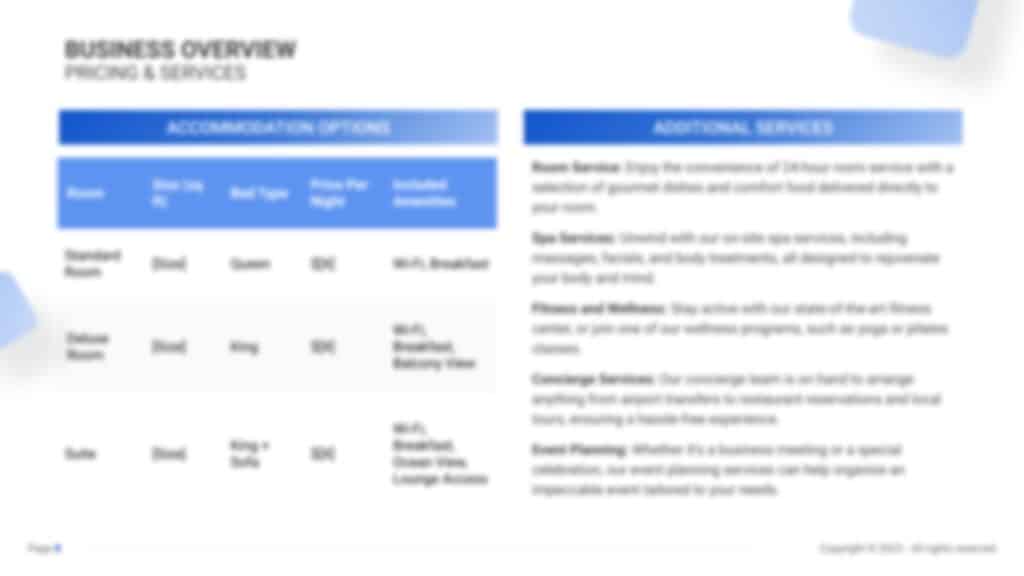
Market Overview
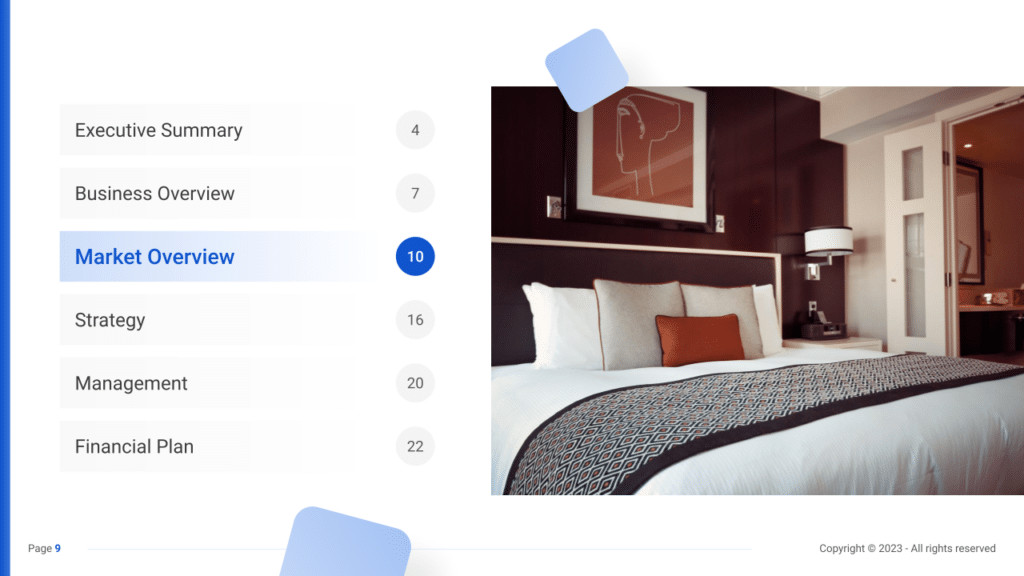
Industry size & growth
In the Market Overview of your boutique hotel business plan, begin by examining the size of the hospitality industry, specifically focusing on boutique hotels, and its growth potential. This analysis is crucial for understanding the market’s breadth and identifying opportunities for expansion.
Key market trends
Proceed to discuss recent market trends, such as the increasing consumer interest in unique, personalized lodging experiences, sustainable and eco-friendly practices, and the integration of local culture into the guest experience. For example, highlight the demand for accommodations that offer a more intimate, personalized experience compared to larger chain hotels, alongside the rising popularity of hotels that incorporate sustainable operations and local cultural elements.
Competitive Landscape
A competitive analysis is not just a tool for gauging the position of your boutique hotel in the market and its key competitors; it’s also a fundamental component of your business plan.
This analysis helps in identifying your boutique hotel’s unique selling points, essential for differentiating your business in a competitive market.
In addition, competitive analysis is integral to laying a solid foundation for your business plan. By examining various operational aspects of your competitors, you gain valuable information that ensures your business plan is robust, informed, and tailored to succeed in the current market environment.
Identifying Your Competitors in the Boutique Hotel Industry
To initiate a robust competitive analysis, it’s crucial to delineate both direct and indirect competitors. Direct competitors encompass boutique hotels in your vicinity offering analogous services and experiences. Indirect competitors may span a spectrum, including larger hotel chains, alternative accommodations like bed-and-breakfasts, vacation rentals, and other unique lodging experiences available through platforms like Airbnb or VRBO.
Leveraging digital tools such as Google Maps, TripAdvisor, and booking websites enables a comprehensive mapping of rival hotels. Customer reviews and ratings often reveal nuanced aspects of competitors’ strengths and shortcomings. Praise for “The Oasis Retreat’s” serene garden setting or accolades for “Harbor Lights Boutique Hotel’s” waterfront views spotlight competitive advantages that warrant closer scrutiny.
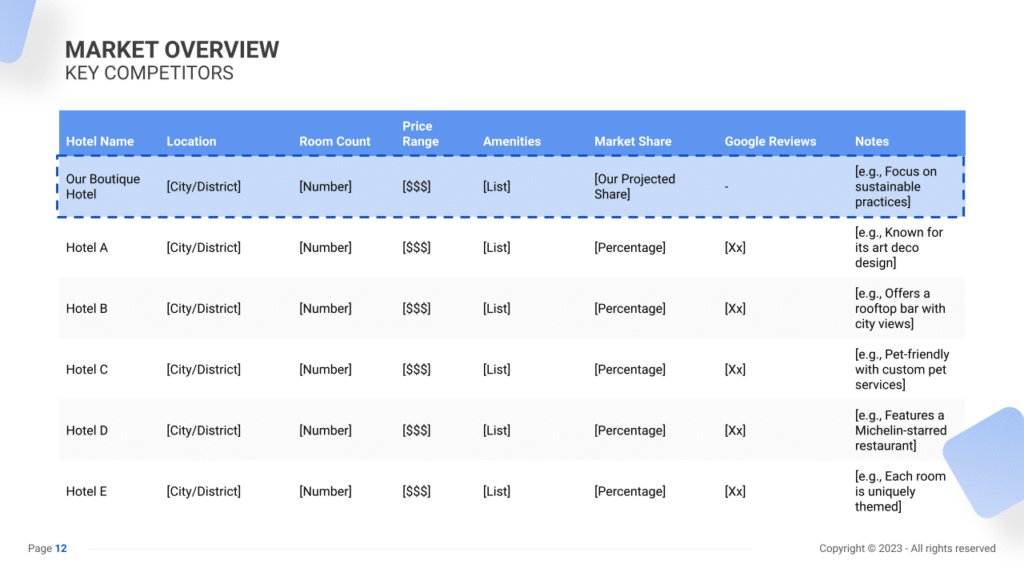
Boutique Hotel Competitors’ Strategies
Diving deeper into the competitive landscape necessitates a multi-faceted analysis encompassing various strategic elements:
- Distinctive Offerings: Scrutinize competitors’ unique services and amenities. If “Bella Vista Hotel” boasts an in-house fine dining restaurant and “The Aurora Boutique” focuses on bespoke experiential packages like hot air balloon rides, these distinctive features define their market niches.
- Pricing and Value Perception: Align your pricing strategy with the perceived value. Comparative analysis of room rates, package inclusions, and seasonal offers helps in gauging where your establishment stands in the spectrum of affordability and luxury compared to competitors.
- Marketing Tactics: Evaluate the efficacy of competitors’ marketing approaches. Some boutique hotels might thrive on influencer collaborations, while others rely on targeted digital campaigns or traditional print media to reach their target demographics.
- Guest Experience and Service Excellence: Examine the holistic guest experience. If “Elysian Haven” garners acclaim for exceptional personalized services or “Azure Heights” stands out for its technological advancements facilitating seamless guest interactions, these aspects inform your competitive analysis.
- Operational Innovation: Explore operational efficiencies or technological integrations. “TechSavvy Suites” might leverage cutting-edge technology for check-ins and amenities, while “Retro Chic Hotel” may emphasize vintage charm with modern conveniences.
What’s Your Boutique Hotel’s Value Proposition?
Reflect on your hotel’s unique selling points and value proposition. Maybe your establishment stands out due to its historic charm, eco-friendly practices, or thematic room designs.
Identify gaps in the market through guest feedback and industry trends. For example, if travelers are seeking eco-conscious accommodations and your competitors lack sustainability initiatives, this presents an opportunity for your hotel to shine.
Consider the location’s influence on your hotel’s offerings. A boutique hotel located in a bustling downtown area might focus on business travelers and offer convenient meeting spaces, while one nestled in the scenic countryside could emphasize serene retreats and outdoor activities.
Strategy
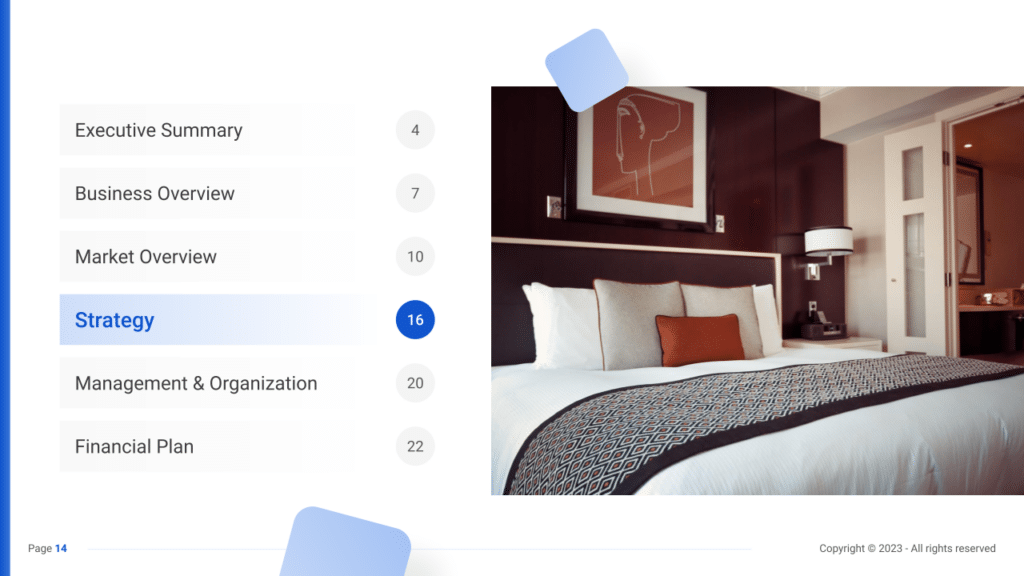
SWOT
First, conduct a SWOT analysis for the boutique hotel, highlighting Strengths (such as unique guest experiences and personalized services), Weaknesses (including high operational costs or dependency on tourism trends), Opportunities (for example, a growing demand for boutique and unique lodging experiences), and Threats (such as economic downturns that may reduce travel spending).
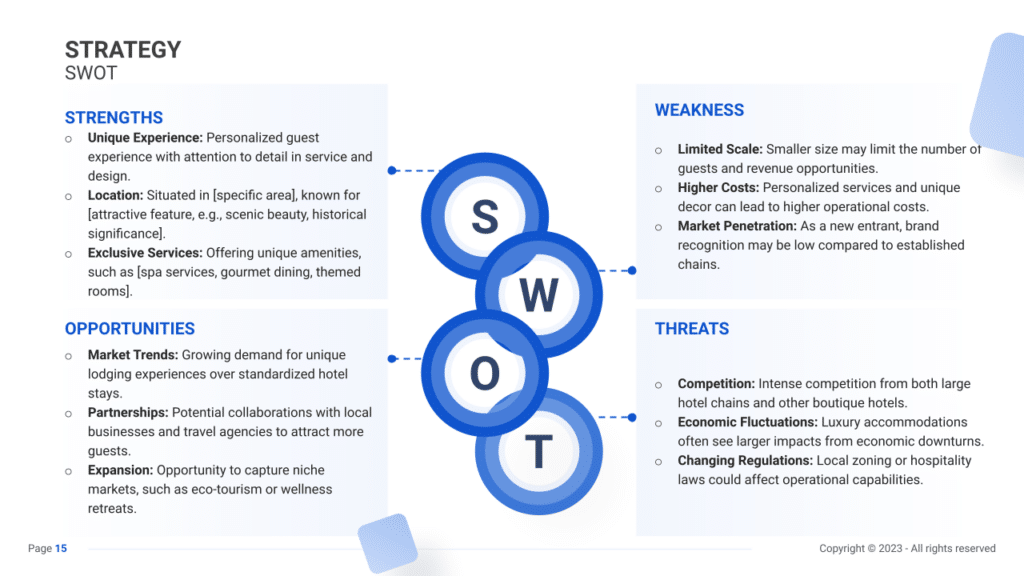
Marketing Plan
Next, develop a marketing strategy that outlines how to attract and retain guests through targeted advertising, promotional offers, a strong online presence, and community engagement. Consider leveraging the uniqueness of your hotel’s location, design, and services in your marketing efforts to distinguish your property from competitors.
Marketing Channels
Leverage diverse marketing channels to promote your boutique hotel and engage potential guests effectively:
Digital Marketing
Harness the Power of Online Presence:
- Website Optimization: Develop a user-centric website showcasing high-resolution images, guest testimonials, virtual tours, and an intuitive booking system. Ensure seamless navigation and mobile responsiveness.
- Social Media Engagement: Utilize platforms like Instagram, Facebook, Twitter, and emerging platforms like TikTok to share captivating visuals, guest stories, special offers, and behind-the-scenes glimpses. Engage with followers actively to build a community around your brand.
- Content Marketing: Publish engaging and informative blog articles featuring local travel guides, insider tips, stories about the hotel’s history or unique offerings, and interviews with staff to attract organic traffic and enhance your online presence.
Paid Advertising
- Targeted Advertising: Deploy pay-per-click (PPC) campaigns on Google Ads, Facebook Ads, and other social media platforms to target specific demographics, interests, or geographic locations. Tailor ad content to resonate with your ideal guests.
- Retargeting Campaigns: Implement retargeting ads to re-engage website visitors who have shown interest but haven’t made a booking. Utilize compelling offers or reminders to prompt them to reconsider their decision.
Local Engagement
Forge Strong Community Connections:
- Partnerships: Collaborate with local businesses, such as restaurants, tour operators, art galleries, or event organizers, to create exclusive packages or joint promotions. Mutual collaborations can expand your reach and offer guests unique experiences.
- Local Events and Sponsorships: Participate in or sponsor local events, festivals, or charitable initiatives to increase visibility within the community. Supporting local causes enhances brand reputation and demonstrates social responsibility.
Promotional Activities
Attract Guests with Compelling Offers:
- Special Packages: Curate themed packages or seasonal promotions, such as ‘Cultural Immersion Experience,’ ‘Wellness Retreat,’ or ‘Family Fun Package,’ bundled with exclusive experiences or complimentary services.
- Early Bird Discounts: Offer incentives like discounts, complimentary meals, or room upgrades for guests booking in advance or during specific promotional periods. Limited-time offers can stimulate bookings and create a sense of urgency.
- Referral Programs: Encourage existing guests to refer friends or family by providing incentives like discounts on future stays, complimentary amenities, or loyalty points. Word-of-mouth referrals are powerful for driving new bookings.
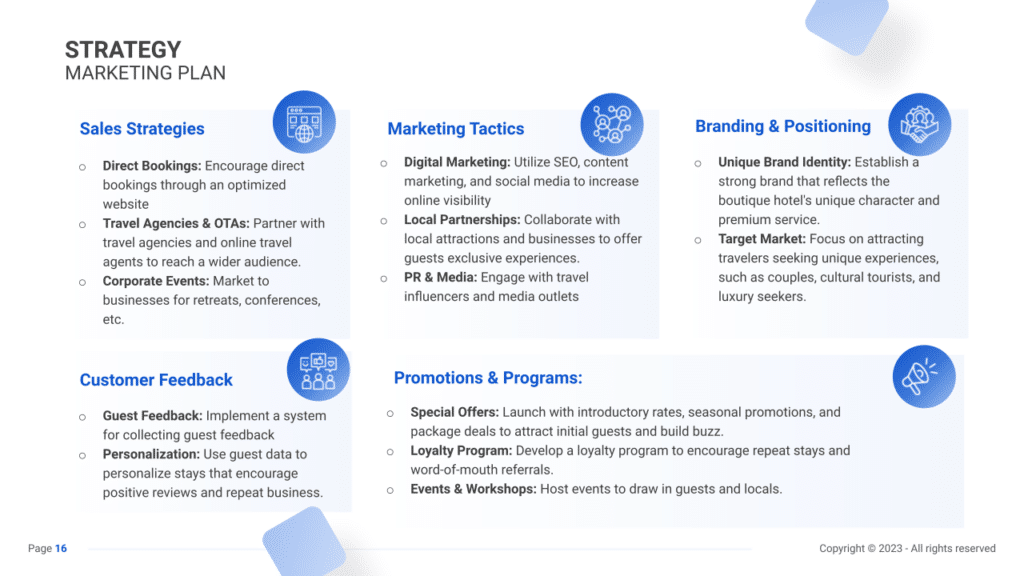
Sales Channels
Efficient Sales Strategies Enhance Guest Experience:
Direct Booking Platforms and Technology
Invest in User-Friendly Platforms:
- Seamless Online Booking: Ensure the hotel’s website and mobile app (if available) feature a user-friendly interface with an intuitive and secure booking system. Streamline the reservation process to facilitate easy navigation and minimize booking steps for a hassle-free experience.
- Personalized Guest Communication: Implement chatbots or automated messaging systems to provide instant responses to guest inquiries, assist in booking processes, and offer personalized recommendations based on guest preferences and previous stays.
Direct Bookings
Encourage Direct Bookings:
- Direct Booking Benefits: Offer exclusive perks such as complimentary breakfast, room upgrades, flexible cancellation policies, or access to members-only deals for guests booking directly through your hotel’s website or phone.
- Membership Programs: Establish loyalty programs offering points, rewards, or tiered membership benefits for guests who book directly. Personalized offerings and recognition incentivize repeat visits and foster guest loyalty.
Upselling and Ancillary Services
Maximize Revenue per Guest Stay:
- Upselling Opportunities: Train staff to upsell room upgrades, dining experiences, spa treatments, local tours, or curated packages during the booking process or upon check-in. Tailored recommendations can enhance guest experiences and revenue.
- Retail Sales: Curate a boutique within the hotel showcasing locally sourced products, branded merchandise, or exclusive items related to the hotel’s theme. Unique offerings serve as mementos for guests and add to the hotel’s revenue stream.
Strategy Timeline
Finally, create a detailed timeline that outlines critical milestones for the boutique hotel’s launch, marketing initiatives, guest base development, and expansion goals, ensuring the business progresses with clear direction and purpose.

Management
The Management section focuses on the boutique hotel’s management and their direct roles in daily operations and strategic direction. This part is crucial for understanding who is responsible for making key decisions and driving the boutique hotel towards its financial and operational goals.
For your boutique hotel business plan, list the core team members, their specific responsibilities, and how their expertise supports the business.


Financial Plan
The Financial Plan section is a comprehensive analysis of your financial projections for revenue, expenses, and profitability. It lays out your boutique hotel’s approach to securing funding, managing cash flow, and achieving breakeven.
This section typically includes detailed forecasts for the first 5 years of operation, highlighting expected revenue, operating costs and capital expenditures.
For your boutique hotel business plan, provide a snapshot of your financial statement (profit and loss, balance sheet, cash flow statement), as well as your key assumptions (e.g. number of customers and prices, expenses, etc.).
Make sure to cover here
_ Profit and Loss
_ Cash Flow Statement
_ Balance Sheet
_ Use of Funds
